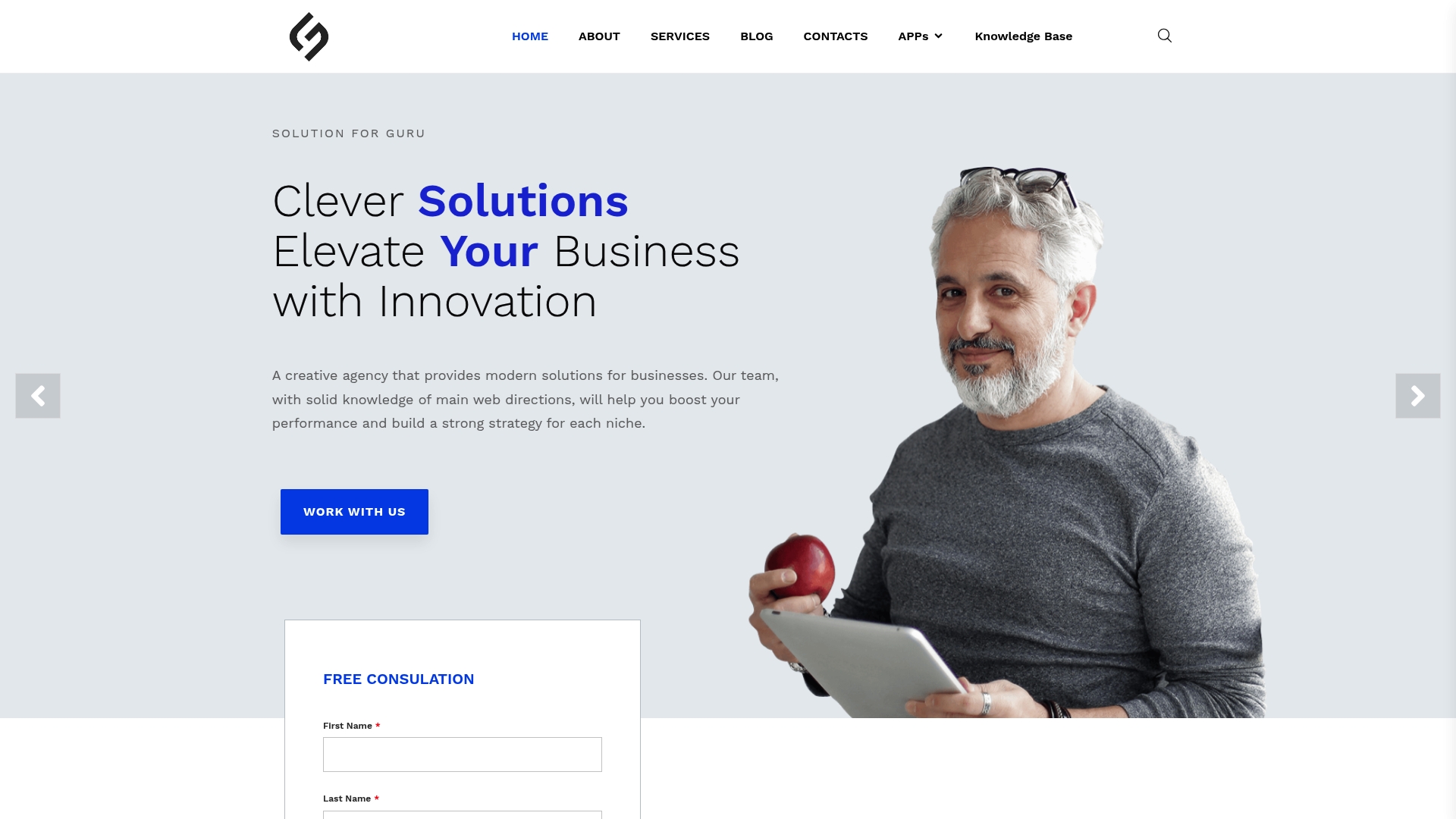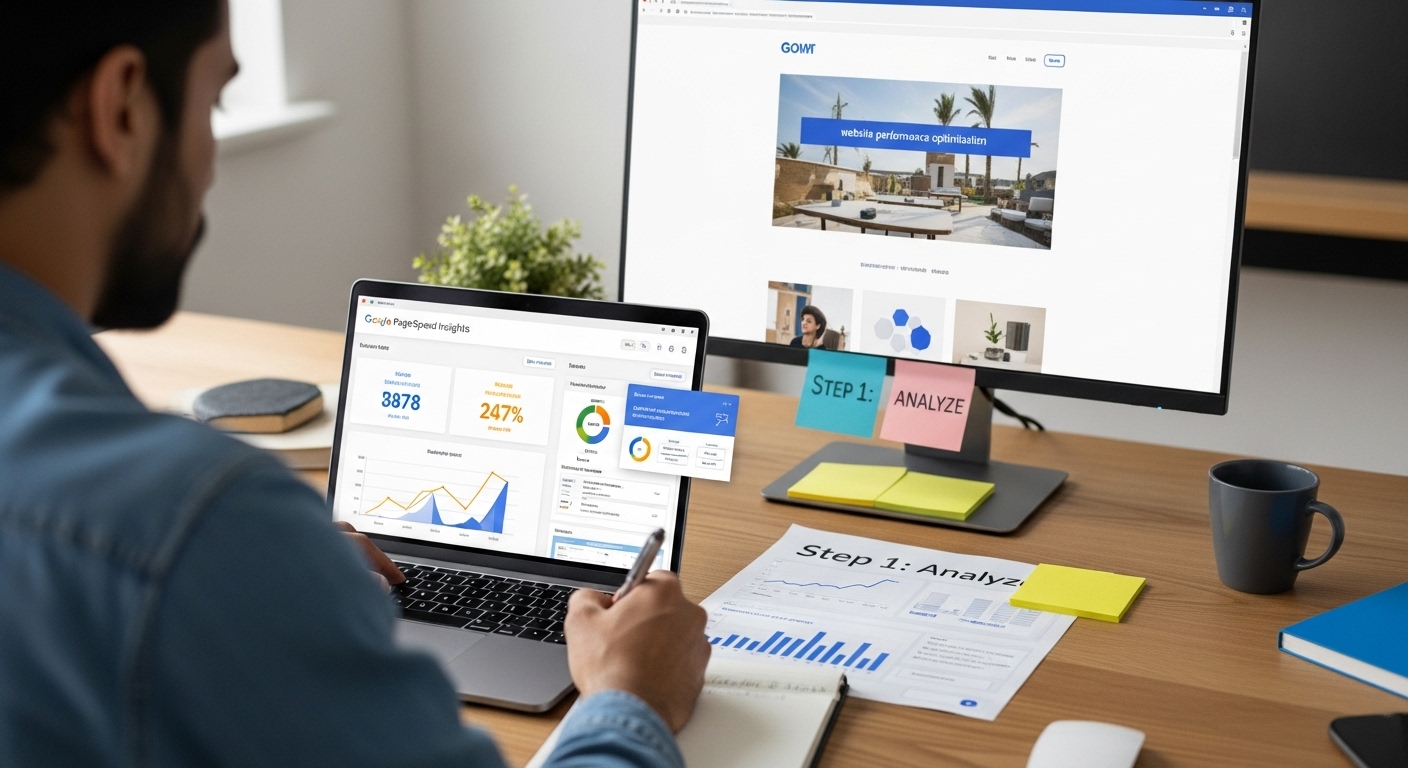How to Choose a Digital Agency for Your Business

Picking a digital agency can seem overwhelming when every website is packed with promises and slick portfolios. Here is something most people miss. Agencies with a clear strategic blueprint outperform by up to 60 percent when goals are precisely defined right from the start. So instead of racing to compare flashy websites, the real edge comes from drilling down on your own goals first. That’s the step that sets every great choice apart.
Table of Contents
- Step 1: Define Your Business Goals And Needs
- Step 2: Research Potential Agencies Thoroughly
- Step 3: Evaluate Agency Portfolios And Case Studies
- Step 4: Schedule Consultations And Ask Key Questions
- Step 5: Compare Proposals And Assess Compatibility
- Step 6: Make Your Final Decision And Set Expectations
Quick Summary
| Key Point | Explanation |
|---|---|
| 1. Define clear business objectives | Understand your specific digital needs to guide agency selection effectively. |
| 2. Conduct thorough agency research | Utilize multiple channels to assess potential agencies’ expertise and past success. |
| 3. Evaluate portfolios critically | Analyze case studies for measurable outcomes and strategic problem-solving displays. |
| 4. Prepare key questions for consultations | Develop thoughtful queries to gauge agency capability and compatibility effectively. |
| 5. Establish clear expectations | Create a detailed project roadmap to outline deliverables and performance indicators. |
Step 1: Define Your Business Goals and Needs
Choosing the right digital agency begins with a crystal clear understanding of your business objectives. Before diving into agency selection, you need to map out precisely what you want to achieve through digital transformation. This initial step is about creating a strategic blueprint that will guide your entire agency search process.
Start by conducting an internal assessment of your current digital infrastructure and performance gaps. What specific challenges are hindering your business growth? Are you struggling with inefficient online marketing, outdated website design, poor customer engagement, or limited digital reach? Identifying these pain points will help you articulate exactly what services you need from a potential digital partner.

Consider creating a comprehensive document that outlines your primary business goals. Break down your objectives into specific, measurable categories such as increasing web traffic, improving conversion rates, enhancing brand visibility, or developing a more robust e-commerce platform. Each goal should be accompanied by clear metrics and desired outcomes. For instance, if your aim is to boost online sales, specify the percentage increase you want to achieve within a specific timeframe.
Your goal-defining process should also account for your business’s unique characteristics. A small local business will have different digital needs compared to a rapidly scaling startup or an established enterprise. Learn more about digital strategy alignment to understand how different organizational structures require tailored digital approaches.
Key elements to document during this goal-defining stage include:
- Current digital performance benchmarks
- Short-term and long-term business objectives
- Budget constraints and investment capabilities
- Specific technical or creative requirements
- Desired timeline for digital transformation
Remember that transparency and specificity are crucial. The more precisely you can articulate your needs, the better positioned you’ll be to find a digital agency that can truly deliver transformative solutions tailored to your business landscape.
Here is a checklist table to help you document and verify that your business goals and needs are fully defined before approaching digital agencies.
| Checklist Item | Description | Example |
|---|---|---|
| Current Digital Performance Benchmarks | Assess KPIs like web traffic, conversions, or engagement rates | Website traffic: 5,000/month |
| Short-Term Objectives | Specify immediate results you want to achieve | Increase conversions by 10% in 3 months |
| Long-Term Objectives | Define growth targets for the next 1-2 years | Launch e-commerce by Q4 |
| Budget Constraints | Set clear investment limits and ranges | Max budget: $50,000 |
| Technical/Creative Requirements | List specific features, platforms, or creative needs | Mobile app, new branding |
| Desired Timeline | Establish a realistic project timeframe | Complete by December 31 |
Step 2: Research Potential Agencies Thoroughly
Researching potential digital agencies requires a strategic and comprehensive approach that goes well beyond basic online searches. After defining your business goals, the next critical step is to develop a systematic method for evaluating potential digital partners who can transform your technological landscape.
Begin by creating a comprehensive research strategy that leverages multiple information channels. Professional networking platforms like LinkedIn can provide initial insights into agency credentials, while industry-specific directories and professional associations offer curated lists of reputable digital service providers. Look for agencies with demonstrated expertise in your specific business vertical and proven track records of delivering measurable results.
Your research should focus on assessing an agency’s digital portfolio and past performance. Examine their case studies, client testimonials, and project histories with a critical eye. Pay special attention to projects similar to your business scope and technological requirements. Explore comprehensive digital agency evaluation techniques to refine your selection process and understand key evaluation metrics.
Dive deep into each potential agency’s online presence. Analyze their website design, content quality, responsiveness, and overall digital representation. A professional digital agency should demonstrate exceptional digital capabilities through their own online platforms. Check their social media engagement, blog content, and thought leadership materials to gauge their industry knowledge and communication style.
Critical research elements to document include:
- Agency’s industry specialization and technical expertise
- Client portfolio and success stories
- Years of operational experience
- Range of services offered
- Pricing models and transparency
Remember that thorough research is not just about collecting information but critically evaluating each potential partner’s alignment with your specific business objectives. Your goal is to narrow down a list of agencies that not only have impressive credentials but also demonstrate a genuine understanding of your unique digital transformation needs.
Step 3: Evaluate Agency Portfolios and Case Studies
Evaluating digital agency portfolios and case studies is more than a cursory review. It is a strategic deep dive into understanding an agency’s capabilities, problem-solving approach, and real-world performance. This critical step transforms abstract marketing materials into tangible evidence of an agency’s potential to drive your business forward.
Begin by examining each agency’s portfolio with a discerning and analytical mindset. Look beyond glossy project images and seek substantive details about their work. Pay close attention to the specific challenges each case study addresses, the innovative solutions implemented, and most importantly, the measurable outcomes achieved. A truly exceptional portfolio will demonstrate not just aesthetic design or technical capabilities, but a strategic approach to solving complex business problems.
Consider the diversity and relevance of their previous projects. An agency that has successfully worked with businesses similar to yours in scale, industry, or technological requirements will likely understand your unique challenges more intuitively. Explore comprehensive digital strategy evaluation methods to gain deeper insights into portfolio assessment techniques.
When reviewing case studies, create a structured evaluation framework that goes beyond surface-level impressions. Assess each project through multiple lenses: technical execution, creative problem-solving, return on investment, and long-term impact. Look for quantifiable metrics that demonstrate tangible business improvements such as increased website traffic, higher conversion rates, improved user engagement, or significant revenue growth.
Key evaluation criteria for portfolios and case studies include:
- Complexity and diversity of previous projects
- Demonstrated industry expertise
- Measurable business outcomes
- Innovative solution approaches
- Client testimonials and long-term relationship evidence
Remember that a portfolio is more than a collection of completed projects. It is a narrative of an agency’s strategic thinking, technological proficiency, and ability to translate complex business challenges into effective digital solutions. Your goal is to find an agency whose past work resonates with your vision and demonstrates the capability to transform your digital landscape.

Step 4: Schedule Consultations and Ask Key Questions
Scheduling consultations with potential digital agencies is a pivotal moment in your selection process. This step transforms your research from theoretical exploration into a concrete opportunity to assess each agency’s potential as a true business partner. Approach these consultations as strategic conversations designed to uncover the depth of their expertise and compatibility with your organizational goals.
Prepare meticulously for these meetings by developing a comprehensive set of strategic questions that probe beyond surface-level capabilities. Your objective is to create a dialogue that reveals the agency’s problem-solving approach, communication style, and genuine understanding of your business challenges. Draft questions that require substantive responses, avoiding yes-or-no queries that provide minimal insight. Learn more about effective consultation strategies to enhance your interview technique.
During the consultation, focus on understanding the agency’s methodology, team composition, and approach to project management. Pay close attention to how they articulate solutions, their level of industry knowledge, and their ability to translate technical concepts into business value. Watch for their listening skills and whether they seem genuinely interested in understanding your unique business context rather than presenting a one-size-fits-all pitch.
The consultation is also an opportunity to assess cultural and communication fit. Observe the team’s dynamics, responsiveness, and willingness to provide transparent and detailed explanations. A great digital agency should feel like a collaborative partner, not just a service provider. They should demonstrate flexibility, creativity, and a proactive approach to addressing potential challenges.
Key questions to ask during consultations include:
- How do you approach custom digital transformation for businesses like ours?
- What is your typical project timeline and communication process?
- Can you provide specific examples of challenges you’ve solved for similar clients?
- How do you measure and report project success?
- What ongoing support and maintenance do you offer post-project completion?
Remember that a successful consultation is a two-way conversation. Your goal is to gain deep insights into the agency’s capabilities, work culture, and potential to become a strategic technology partner who can genuinely elevate your business performance.
Step 5: Compare Proposals and Assess Compatibility
Comparing digital agency proposals requires a systematic and nuanced approach that goes far beyond simple price comparisons. This critical step transforms your research and consultations into a strategic decision-making process where you carefully evaluate each agency’s potential to become a transformative business partner.
Create a comprehensive comparison matrix that allows you to objectively assess each proposal’s strengths and weaknesses. This tool should capture more than just financial considerations. Evaluate each proposal’s depth of understanding, proposed strategy, technological approach, potential impact, and alignment with your specific business objectives. Look beyond surface-level promises and examine the underlying methodology and innovative thinking each agency brings to the table.
Pay close attention to the detailed project roadmap presented in each proposal. A high-quality proposal will demonstrate a clear understanding of your business challenges, outline a structured approach to solving them, and provide transparent timelines and deliverable expectations. Explore detailed digital strategy comparison techniques to refine your evaluation process and understand key assessment metrics.
Compatibility assessment extends beyond technical capabilities. Consider the agency’s communication style, cultural alignment, and potential for long-term partnership. An agency that demonstrates flexibility, proactive problem-solving, and genuine investment in your success will likely be more valuable than one offering the lowest price point. Examine their proposed team composition, level of expertise, and commitment to ongoing support and collaboration.
Key evaluation criteria for proposal comparison include:
- Alignment with original business goals
- Comprehensive understanding of project requirements
- Innovative problem-solving approach
- Pricing structure and value proposition
- Proposed timeline and project milestones
- Potential for long-term strategic partnership
Remember that the most expensive proposal is not necessarily the best, nor is the cheapest option the most cost-effective. Your goal is to find a digital agency that offers a balanced combination of technical expertise, strategic thinking, and genuine commitment to driving your business forward.
This step overview table summarizes each stage in choosing a digital agency, including main focus and typical outcomes to help you track your progress during the process.
| Step | Main Focus | Typical Outcome |
|---|---|---|
| 1. Define Goals | Clarify business objectives and digital needs | Custom blueprint for agency search |
| 2. Research Agencies | Evaluate credentials, portfolios, and online presence | Shortlist of qualified agencies |
| 3. Assess Portfolios | Analyze case studies for measurable results | Evidence of relevant expertise |
| 4. Consult & Interview | Ask strategic questions to test compatibility | Deeper understanding of agency fit |
| 5. Compare Proposals | Analyze strategies and pricing | Detailed comparison matrix |
| 6. Finalize & Set Expectations | Align on deliverables, metrics, and timelines | Formalized project agreement |
| The right partner will view your project as an opportunity for collaborative success, not just a transactional engagement. |
Step 6: Make Your Final Decision and Set Expectations
Making the final decision on a digital agency is more than selecting a service provider. It is establishing a strategic partnership that will fundamentally transform your business’s digital capabilities. This pivotal moment requires careful consideration, clear communication, and a forward-thinking approach that goes beyond initial impressions and proposal details.
Begin by conducting a holistic final evaluation that synthesizes all the information gathered throughout your selection process. Revisit your original business goals and assess which agency demonstrates the most comprehensive alignment with your strategic objectives. Look beyond technical capabilities and consider the intangible factors such as team chemistry, communication style, and potential for long-term collaboration. Explore comprehensive partnership alignment strategies to ensure a robust decision-making process.
Once you have identified your preferred agency, transition immediately into setting crystal-clear expectations. This involves developing a detailed project charter that outlines every aspect of your collaboration. Your documentation should be comprehensive yet flexible, capturing specific deliverables, timelines, communication protocols, performance metrics, and potential contingency plans. A well-crafted agreement serves as a roadmap and a protective mechanism for both parties.
During the final negotiation phase, prioritize transparency and open dialogue. Discuss potential challenges, establish mutual understanding of project scope, and create mechanisms for ongoing feedback and course correction. Your goal is to build a collaborative relationship that encourages innovation, problem-solving, and mutual growth.
Key elements to formalize in your final decision and expectation-setting include:
- Detailed project scope and deliverables
- Specific performance indicators and success metrics
- Communication frequency and reporting structures
- Budget allocation and payment milestones
- Intellectual property and confidentiality agreements
Remember that the right digital agency partnership is not about finding a perfect vendor, but about establishing a dynamic relationship that can adapt, grow, and consistently drive your business forward. Your final decision should reflect not just current needs, but your vision for future digital transformation.
Unlock the Full Potential of Your Digital Agency Search
You have taken the critical first steps to define your goals, identify unique challenges, and research agencies that can drive real results for your business. Maybe you are seeking a partner who truly understands digital transformation and can turn poor web performance or limited customer engagement into measurable growth. Here is where theory meets practice and your vision for digital progress becomes reality.

At Solution4Guru.com, we specialize in tailored digital strategies that align with your specific objectives. Our expertise covers modern web development, UI/UX design, automation, and more so your business can rise above common obstacles and achieve sustainable success. See proof in our in-depth case studies and testimonials and discover what a customer-centric, results-oriented approach can do for you. Book your free consultation today. The right digital agency is only a click away—take action now and empower your next phase of growth.
Frequently Asked Questions
What should I consider before choosing a digital agency?
Before selecting a digital agency, define your business goals, assess your current digital performance, identify specific challenges, and consider your budget and timelines to ensure alignment with your agency’s capabilities.
How do I evaluate a digital agency’s experience?
Evaluate a digital agency’s experience by reviewing their portfolio, case studies, client testimonials, and the diversity of their past projects. Focus on agencies that have worked with businesses similar to yours in scale and industry.
What questions should I ask during agency consultations?
During consultations, ask about their approach to custom digital transformation, typical project timelines, previous challenges they’ve solved for similar clients, how they measure success, and what ongoing support they offer post-project completion.
How can I compare proposals from different digital agencies?
Compare agency proposals by creating a matrix that reviews technical capabilities, understanding of your project, innovative approaches, pricing structures, timelines, and potential for a long-term partnership to facilitate informed decision-making.



